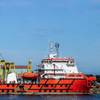Loss-making shipping company Nanjing Tanker Corp will be delisted from the Shanghai Stock Exchange after a five-day grace period, marking the first time for a company backed by the central government to be dropped from a domestic exchange.
The delisting comes after the government allowed China's first-ever public bond default in March and underscores the difficulties facing domestic companies saddled with record debt in a slowing economy.
The delisting had been widely anticipated after the company said in January it was poised to post its fourth straight year of loss, breaching exchange rules.
A statement carried on the Shanghai exchange's official microblog on Friday said Nanjing Tanker will be delisted after booking losses from 2010 to 2013.
The company has the option of appealing the decision in the next five days. Trading in Nanjing Tanker shares has been suspended since April 2013.
Officials at Nanjing Tanker - the oil and bulk chemicals marine freight subsidiary of state-owned Sinotrans & CSC Holdings Co Ltd - declined to comment when contacted by Reuters.
Nanjing Tanker reported 12.45 billion yuan ($2.05 billion) in total debt at the end of September, with debt outpacing equity by more than four times, exchange filings showed.
According to Reuters calculations based on exchange data, around 90 firms have been delisted from the Shanghai and Shenzhen exchanges since their establishment over twenty years ago. However the Nanjing Tanker delisting is the first by a company backed by the central government.
Nanjing parent Sinotrans operates under the direct administration of the State Council's State-owned Assets Supervision and Administration Commission.
Sinotrans reported group turnover of 106.7 billion yuan and assets of 122.9 billion yuan in 2012. The group holds five listed companies, including Sinotrans Ltd - a shipping, warehouse, and railways company - and Sinotrans Shipping Ltd.
The problems of high debt and slowing growth are worse for sectors struggling with overcapacity. The State Council has said it would block new approvals in five industries affected by chronic oversupply, including shipbuilding.
Analysts widely expect more defaults on loans, bonds, and shadow bank products this year. Semiconductor, software, and commodities firms are among the most at risk of default, a Reuters analysis of more than 2,600 Chinese companies showed.
Most government-controlled enterprises are willing to help their subsidiaries stay afloat, but most of those units are in better financial shape than Nanjing Tanker, analysts have said.
(Reporting by Pete Sweeney, Lu Jianxin and Chen Yixin; Writing by Kazunori Takada; Editing by Christopher Cushing)
($1 = 6.2125 Chinese Yuan)






